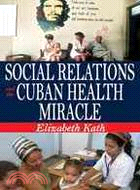Social Relations and the Cuban Health Miracle
商品資訊
ISBN13:9781412814171
出版社:Transaction Pub
作者:Elizabeth Kath
出版日:2010/04/01
裝訂/頁數:精裝/326頁
定價
:NT$ 10800 元若需訂購本書,請電洽客服 02-25006600[分機130、131]。
商品簡介
作者簡介
相關商品
商品簡介
"[Elizabeth Kath] has made a remarkably original contribution to social science research on contemporary Cuba, and I am certain this work will be quite useful for generations of future researchers interested in this topic. It is a richly detailed and intellectually sophisticated analysis of health in contemporary Cuba and an outstanding contribution to the literature."---Katherine Hirschfeld, University of Oklahoma
"Elizabeth Kath explores the profound contradiction in Cuban health care between political intentions and goals on the one hand and the complicated workings of practice on the other. She examines the official picture, often presented through statistics and quoted in many studies, which stresses the achievements of Cuban health care. The most interesting contribution of the book, however, is her scrutiny of the complexities of everyday health care practices. Kath shows that state paternalism, which is one of the reasons for its success, also becomes the very obstacle to health care quality, as fear of not fulfilling the goals set up by the state impede real participation and creativity and counteracts the positive cooperation between medical staff and patients."---Mona Rosendahl, director of the Institute of Latin American Studies, Stockholm University (Sweden) and author of Inside the Revolution: Everyday Life in Socialist Cuba
"In this astute and unflinching examination of Cuba's health care system, Elizabeth Kath pulls back the curtain on the island's `medical miracle' to reveal how its top-down approach limits the ability of the Cuban people to influence their own medical care. Filled with insights based on extensive field research, this book illuminates the paradoxes of the Cuban model and reveals important lessons for everyone concerned about improving health care outcomes in the developing world."---Daniel P. Erikson, senior associate for U.S. policy at the Inter-American Dialogue and author of The Cuba Wars: Fidel Castro, the United States, and the Next Revolution
This selection of essays, articles, and speeches by Horowitz is cumulatively a statement of the collective national disaster suffered by Cubans for the past half century. The volume aims to explain the theory and practice of the regime, the absence of internal opposition, and the persistence of external support for Castro. Even with the collapse of Soviet communism, the ideology that underwrites Communist regimes remains the defining characteristics of Castro's Cuba.
For Cuba's supporters, health is the most commonly cited evidence of the socialist system's success. Even critics often concede that this is the country's saving grace. Cuba's health statistics are indeed extraordinary. This small island outperforms virtually all of its neighboring countries and all countries of the same level of economic development. Some of its health statistics rival wealthy industrialized countries. Moreover, these health outcomes have resulted against all odds.
Setting out to unravel this puzzle, the author finds that Cuba possesses an unusually high level of popular participation and cooperation in the implementation of health policy. This has been achieved with the help of a longstanding government that prioritizes public health, and has enough political influence to compel the rest of the community to do the same. On the other hand, popular participation in decision-making regarding health policy is minimal, which contrasts with the image of popular participation often promoted. Political elites design and impose health policy, allowing little room for other health sector groups to meaningfully contribute to or protest official decisions. This is a problem because aspects of health care that are important to those who use the system, or work within it, can be neglected if they do not fit within official priorities.
The author remains, overall, supportive of health achievement in Cuba. The country's preventive arrangements, its collective prioritization of key health areas, the improvements in public access to health services through the expansion of health facilities, and the provision of free universal care are among the accomplishments that set it apart. The sustainability and progress of these achievements, however, must involve open recognition and public discussion of weaker aspects of the health system.
"Elizabeth Kath explores the profound contradiction in Cuban health care between political intentions and goals on the one hand and the complicated workings of practice on the other. She examines the official picture, often presented through statistics and quoted in many studies, which stresses the achievements of Cuban health care. The most interesting contribution of the book, however, is her scrutiny of the complexities of everyday health care practices. Kath shows that state paternalism, which is one of the reasons for its success, also becomes the very obstacle to health care quality, as fear of not fulfilling the goals set up by the state impede real participation and creativity and counteracts the positive cooperation between medical staff and patients."---Mona Rosendahl, director of the Institute of Latin American Studies, Stockholm University (Sweden) and author of Inside the Revolution: Everyday Life in Socialist Cuba
"In this astute and unflinching examination of Cuba's health care system, Elizabeth Kath pulls back the curtain on the island's `medical miracle' to reveal how its top-down approach limits the ability of the Cuban people to influence their own medical care. Filled with insights based on extensive field research, this book illuminates the paradoxes of the Cuban model and reveals important lessons for everyone concerned about improving health care outcomes in the developing world."---Daniel P. Erikson, senior associate for U.S. policy at the Inter-American Dialogue and author of The Cuba Wars: Fidel Castro, the United States, and the Next Revolution
This selection of essays, articles, and speeches by Horowitz is cumulatively a statement of the collective national disaster suffered by Cubans for the past half century. The volume aims to explain the theory and practice of the regime, the absence of internal opposition, and the persistence of external support for Castro. Even with the collapse of Soviet communism, the ideology that underwrites Communist regimes remains the defining characteristics of Castro's Cuba.
For Cuba's supporters, health is the most commonly cited evidence of the socialist system's success. Even critics often concede that this is the country's saving grace. Cuba's health statistics are indeed extraordinary. This small island outperforms virtually all of its neighboring countries and all countries of the same level of economic development. Some of its health statistics rival wealthy industrialized countries. Moreover, these health outcomes have resulted against all odds.
Setting out to unravel this puzzle, the author finds that Cuba possesses an unusually high level of popular participation and cooperation in the implementation of health policy. This has been achieved with the help of a longstanding government that prioritizes public health, and has enough political influence to compel the rest of the community to do the same. On the other hand, popular participation in decision-making regarding health policy is minimal, which contrasts with the image of popular participation often promoted. Political elites design and impose health policy, allowing little room for other health sector groups to meaningfully contribute to or protest official decisions. This is a problem because aspects of health care that are important to those who use the system, or work within it, can be neglected if they do not fit within official priorities.
The author remains, overall, supportive of health achievement in Cuba. The country's preventive arrangements, its collective prioritization of key health areas, the improvements in public access to health services through the expansion of health facilities, and the provision of free universal care are among the accomplishments that set it apart. The sustainability and progress of these achievements, however, must involve open recognition and public discussion of weaker aspects of the health system.
作者簡介
Elizabeth Kath is a research fellow with the Global Cities Institute at RMIT University in Melbourne, Australia. Her work has focused mainly on Cuba. In addition, she is the author of numerous works that have appeared in Policy and Politics, Cuba in Transition, Cuba Siglo 21, and Dialogue.
主題書展
更多
主題書展
更多書展今日66折
您曾經瀏覽過的商品
購物須知
外文書商品之書封,為出版社提供之樣本。實際出貨商品,以出版社所提供之現有版本為主。部份書籍,因出版社供應狀況特殊,匯率將依實際狀況做調整。
無庫存之商品,在您完成訂單程序之後,將以空運的方式為你下單調貨。為了縮短等待的時間,建議您將外文書與其他商品分開下單,以獲得最快的取貨速度,平均調貨時間為1~2個月。
為了保護您的權益,「三民網路書店」提供會員七日商品鑑賞期(收到商品為起始日)。
若要辦理退貨,請在商品鑑賞期內寄回,且商品必須是全新狀態與完整包裝(商品、附件、發票、隨貨贈品等)否則恕不接受退貨。
























